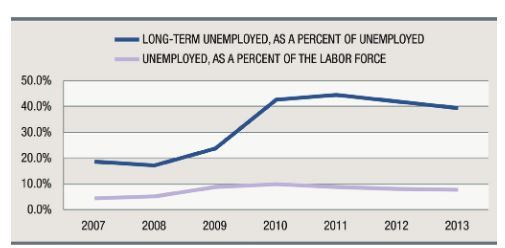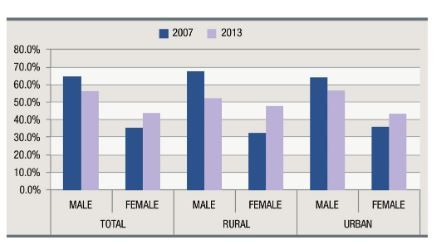In the wake of the 2008 financial crisis, 39% of US unemployed people have been out of work for at least six months, more than twice as many as in 2007, says a new study on long-term unemployment trends since the Great Recession from the Carsey Institute at the University of New Hampshire.
While the overall unemployment rate has dropped significantly since the height of the Great Recession, from over 10% in 2101 to 6.7% in December 2013, the long-term unemployment rate has remained stubbornly high.
The study is presented in the brief “The Long-Term Unemployed in the Wake of the Great Recession.”
Doctoral candidate in sociology, Andrew Schaefer, said:
“As the debate about the extension of the federal Emergency Unemployment Compensation program continues, it is important to gain an understanding of the long-term unemployed in terms of their demographic and economic characteristics and how those characteristics differ across place.”
“Doing so can help better target strategies for alleviating the negative effects of long-term unemployment.”
(Source: Carsey Institute)
Schaefer said that the percentage of unemployed American workers who were looking for jobs for over six months rose from 18.4% in 2007 to 39.3% in 2013.
Over the same period, the percentage of women among people out of work for more than six months rose from 35% in 2007 to 44% in 2013. The percentage of men, however, fell from 65% to 56%.
There is a diminishing gender gap among the long term unemployed. (Source: Carsey Institute)
Long term unemployment more common in urban areas
The study also found that long-term unemployed workers are more likely to live in urban areas than short-term unemployed workers. Eighty-seven percent of workers who have been jobless for at least six months live in urban areas, compared to the short-term unemployed.
Compared to their rural counterparts, long-term unemployed workers are more likely to be:
- older
- more ethnically and racially diverse
- higher educated
- married
However, rural long term unemployed people are more likely to be poor than their urban counterparts.
A study carried out by the Economic Policy Institute showed that the US job market remains weak.



